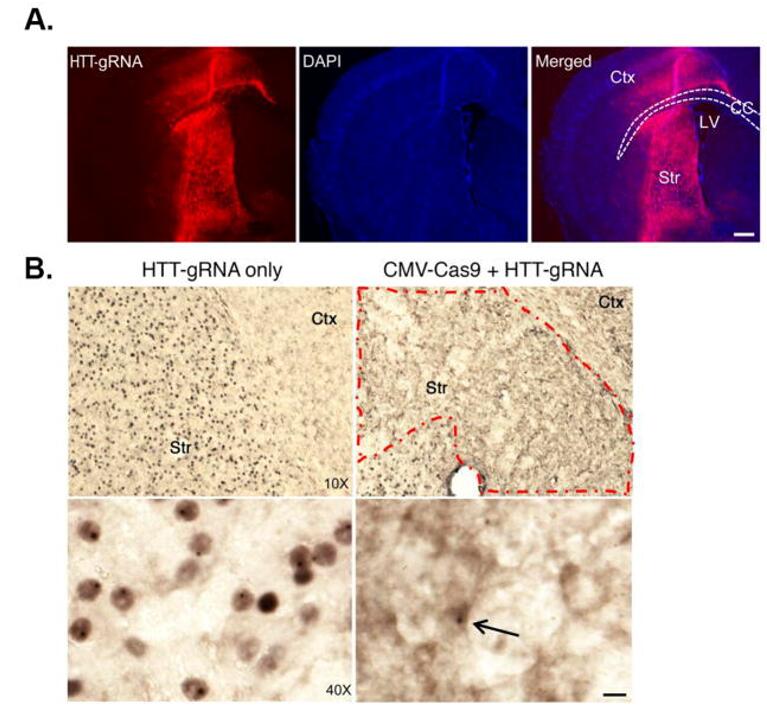
Our promise to you:
Guaranteed product quality, expert customer support.
 24x7 CUSTOMER SERVICE
24x7 CUSTOMER SERVICE
 CONTACT US TO ORDER
CONTACT US TO ORDER
CRISPR Mouse for Neurodegenerative Disease Modeling 
Animal models are very valuable and have been widely used to study neurological diseases and find therapeutic targets for them. Since many neurodegenerative diseases may be caused by mutations in gene DNA, the ability of CRISPR/Cas9 to directly target any gene in one or both alleles of the embryonic genome opens a new avenue for generating mouse models of neurodegenerative diseases using this new technology.
In addition to genome editing in germline cells, CRISPR/Cas9 can also efficiently target genes in somatic tissues, such as neurons in the brain. gRNA and Cas9 can be delivered to the substantia nigra of animal brains via viral systems to study the effects of Parkin or Pink1 deletion in the adult brain. In addition, Cas9-mediated knock-in mutations within the genome can help generate animal models of neurodegenerative diseases caused by increased toxicity of mutant proteins. In conclusion, CRISPR/Cas9 is now widely used to genetically modify the genomes of various species. the ability of CRISPR/Cas9 to delete DNA sequences and correct DNA mutations opens a new avenue for the treatment of neurodegenerative diseases caused by DNA mutations.
 Fig. 1 CRISPR/Cas9 gene editing reduces pathology in a mouse model of Huntington's disease. (Rohn TT, et al., 2018)
Fig. 1 CRISPR/Cas9 gene editing reduces pathology in a mouse model of Huntington's disease. (Rohn TT, et al., 2018)
Solution
CRISPR/Cas9 PlatformCB provides services for custom CRISPR/Cas9 gene editing animal models from strategy design to F1 animals. We have a variety of genetic tools for modifying the genome of mice to create loss-of-function or gain-of-function models. The identification of genetic mutations in different neurodegenerative diseases has allowed us to generate various gene editing mouse models through the expression of mutant proteins. We now have a variety of mouse models of neurodegenerative diseases derived from the expression of mutated genes under different promoters or using other gene editing approaches. Our mouse models of neurodegenerative diseases established by CRISPR/Cas9 have the following characteristics:
- Age-dependent and progressive development of neuropathology and neurological symptoms.
- Demonstrates accumulation of misfolded or aggregated proteins resulting from mutant gene expression.
- Although mutant proteins are widely expressed throughout the body and brain, the neuronal function appears to be selectively or preferentially affected.
With experienced scientists and an excellent gene editing platform, our staff has successfully bred a variety of gene KO mice as well as knock-in mice for cancer research using CRISPR/Cas9, including but not limited to
- Alzheimer's disease (AD) gene editing mouse model
- Huntington's disease (HD) gene editing mouse model
- Parkinson's disease (PD) gene editing mouse model
- Amyotrophic lateral sclerosis (ALS) gene editing mouse model
What Can We Help You?
- Studying age-related neuropathology of neurodegenerative diseases
- Uncovering common pathology of different neurodegenerative diseases
- Screening for pathogenic genes in neurodegenerative diseases
- Development of targeted therapies for neurodegenerative diseases
Related Services
- Conditional Knockout Mouse
- Conventional Knockout Mouse
- Point Mutation Mouse
- CRISPR/Cas9 Knockin Mouse
- Rosa26 Knockin Mouse
Related Products
CRISPR/Cas9 PlatformCB is a leading global gene editing biotechnology company dedicated to providing the most professional and comprehensive gene editing technology solutions to our customers. We can customize a suitable animal model to meet your requirements. We will also provide you with a final report detailing each step, including target vector design, construction and validation, transfection conditions, genotyping strategy and results.
Reference:
- Rohn TT, et al. The Potential of CRISPR/Cas9 Gene Editing as a Treatment Strategy for Alzheimer's Disease. J Alzheimers Dis Parkinsonism. 2018, 8(3):439.